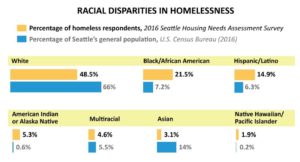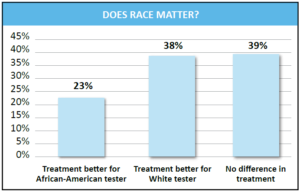SOCR 2018 Housing Discrimination Testing
The Seattle Office of Civil Rights (SOCR) conducts testing every year to determine the prevalence of racism and bias in our housing and employment sectors. Also called “affirmative testing,” this strategy gives the City an opportunity to do outreach and education for people in violation of the law, intentionally or not.
SOCR conducted two main tests:
- A match-pair (a.k.a “secret-shopper”) test whereby two testers, one African American and one White, matched to control for essential differences, contact a property owner about a rental
- Testers that voluntarily disclose a criminal background to illicit questions, statements, or preclusion from an application related to their disclosure
In 2018, SOCR tested for discrimination and/or differential treatment in the housing market based on 1) criminal background, and 2) race. 179 tests were conducted (some of which were multiple contacts to one housing provider), and 42 tests revealed violation of the Fair Chance Housing ordinance. This is legislation I championed in 2017 that makes it illegal for a landlord to request information about criminal history or deny someone housing based on a criminal background.
I sponsored this legislation because involvement with the criminal-legal system is a common proxy for housing discrimination. Conversely there is no rigorously tested evidence connecting bad tenant behavior with a criminal background and we know that barriers to stable housing can lead to increased recidivism. If you are someone concerned with increases in crime, this legislation addresses that by reducing recidivism by increasing access to housing. Finally in efforts to undo the racist implications of the prison-industrial complex, Resolution 31637 adopted in 2015, put the City on track to worked to strengthen peoples’ reentry after incarceration. You can find the report and recommendations here.
The timing is right for these kind of affirmative testing efforts in our housing market, and these testing efforts affirmed that. Seattle is in an affordable housing and homelessness crisis; aside from what we can logically assume, what is less clear is how people of color are disproportionately impacted. This is particularly true for African American people; the latest “Count Us In” data for King County shows that African Americans make up 24% of people experiencing homelessness (1 percentage point up from 2018), while only 6% of the population. Seattle data from 2016 shows a similar disparity:

The match-pair test also revealed evidence of racism:
- 32 out of 53, or 60%, of the “secret-shopper” tests showed differential/discriminatory treatment based upon race.
- 38% of test cases showed better treatment for White people; 23% of test cases showed better treatment for African American people; 39% showed no difference in treatment

The goal of these tests is to support our Seattle Office for Civil Rights as an enforcement agency—it’s my belief that implicit and explicit bias are present in all levels of society, and policy intended to undo racism, heterosexism, cis-sexism, and economic oppression needs to focus on changing behavior by educating about how we are changing these norms in different institutions, and penalizing persistent violators. To that end, this testing gives the City an opportunity to identify a sample of violations and dig deeper to assess awareness and understanding of Fair Housing laws new and old, before applying a punitive response—this is the wholistic approach that SOCR uses in “enforcement” responses.
Of the 42 enforcement actions that were taken, 13 advisory letters were sent to encourage housing providers to contact SOCR to talk about the results of the test so that they could be offered technical assistance and training. A total of 21 housing providers were found in violation outside of the scope of the advisory letters; 12 diligently followed-up with SOCR’s request for copies of their application, screening criteria, and evidence that they have a Fair Housing poster to justify how they were in compliance; 13 were offered training on rental laws in Seattle; and 8 were issued a penalty requisite to the cost of testing expense.
If you believe you’ve had your rights violated in housing, find out more and file a complaint here.
Combat Arts Academy in Delridge—OED Small Business of the Month!
The Seattle Office of Economic Development has highlighted the Combat Arts Academy on Delridge and Brandon for their July feature of the Small Business of the Month! As the chair of the committee that oversees economic development, I encourage and appreciate the department’s efforts to support and uplift small businesses like this, especially in my district!
Owner Sonia Sillan is recognized and interviewed, and it’s cool to see how this small business owner is making martial arts accessible for women and girls and expanding into Burien.
Check out the whole feature here.
South Park Library Reopening Celebration
In late June the South Park Library reopened after being closed two months for renovations. The Library wants to invite you to come celebrate the reopening this Sunday between 2pm and 5pm.
Everyone is welcome and actives are free! There will be brief remarks by myself and others at the start of the program followed by a resource fair, crafts and face painting, a two-story giant slide, a selfie booth, and a food truck with free lunch for the first 100 people!
In-District Office Hours
On July 26, I will be at the Southwest Customer Service Center (2801 SW Thistle St) between 12pm and 5pm. The final meeting of the day will begin at 4:30 p.m.
These hours are walk-in friendly, but if you would like to let me know you’re coming in advance you can email my scheduler Alex Clardy (alex.clardy@seattle.gov).
Additionally, here is a list of my tentatively scheduled office hours. These are subject to change.
- Friday, August 16, 2019
South Park Community Center, 8319 8th Avenue S - Friday, September 27, 2019
Senior Center of West Seattle, 4217 SW Oregon St - Friday, October 25, 2019
Southwest Customer Service Center, 2801 SW Thistle St - Friday, November 29, 2019
South Park Community Center, 8319 8th Avenue S - Friday, December 20, 2019
Senior Center of West Seattle, 4217 SW Oregon St
Response to Court of Appeals Ruling on Municipal High Incomes Tax
A State Court of Appeals issued a ruling earlier this week regarding the municipal tax on high incomes. In response to the ruling, I issued a statement, copied below:
Councilmember Lisa Herbold (District 1, West Seattle – South Park) issued the following statement today in response to the State Court of Appeals ruling on a municipal income tax on the affluent.
“Two years ago my colleagues and I unanimously passed legislation to tax people with high incomes. In doing so we created an opportunity to right a decades-old law that was wrongly decided in the first place.
“Our challenges over time have been two-fold; both statutory and constitutional. The Court of Appeals found the City had the statutory authority to impose an income tax. The court further ruled that a law prohibiting cities from enacting net income taxes is unconstitutional. Having resolved the underlying statutory law, the courts have also cleared the way for a constitutional reconsideration. As such, our state Supreme Court is the last hurdle in this race, thereby moving us one step closer towards reversing Washington’s outdated, regressive and unfair tax structure, which is largely recognized as the most regressive tax structure in the nation.
“The state Supreme Court has an opportunity to put fairness, transparency, adequacy, stability, and economic vitality at the top of their list of values and reverse the narrow 5-4 decision they made in the 1930s, that ruled a city income tax as unconstitutional.
“The ordinance enacting Seattle’s tax identified many pressing priorities, including the homelessness crisis, affordable housing, education, and transit, mental and public health services, and creating green jobs and meeting carbon reduction goals. These are important needs, but as I promised in 2016, if we win this case, my highest priority will be to use some of the revenue to lower the property tax burden and the impact of other regressive taxes, including the business and occupation tax rate for small businesses.”

